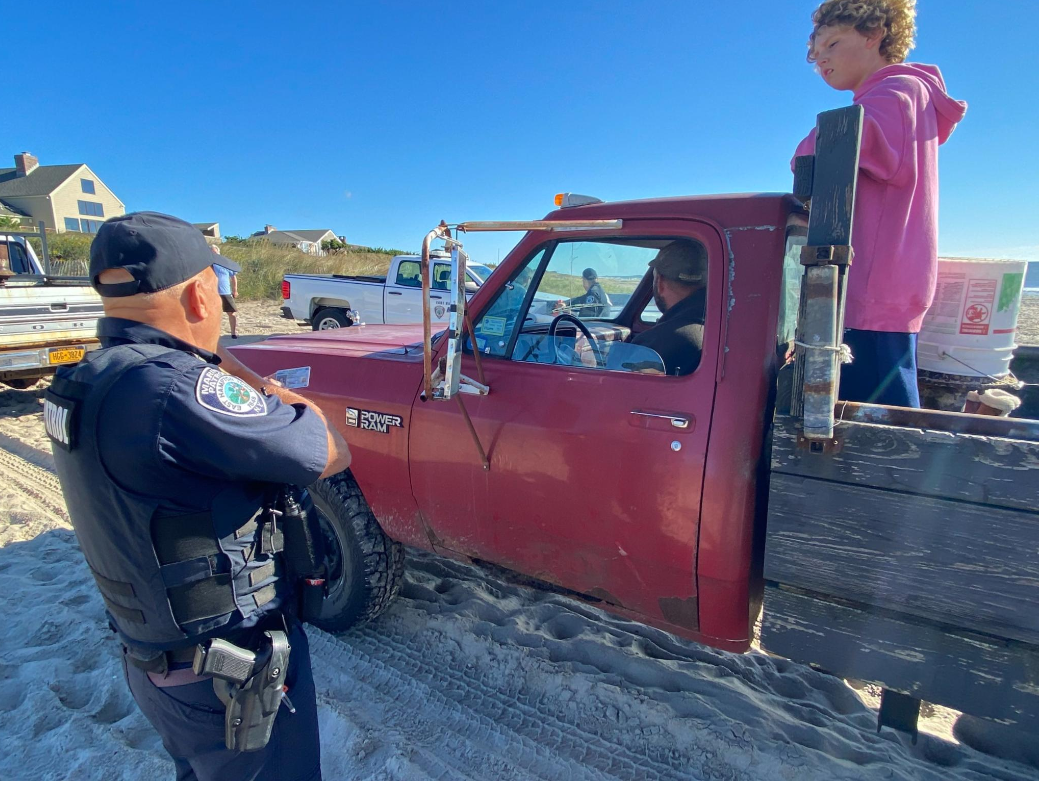Fishermen Issued Tickets For Protest Of ‘Truck Beach’ Ban

2 PhotosMichael Wrighton Oct 20, 2021
- More than a dozen local fishermen and residents were charged with trespassing and issued summonses on Sunday when they drove their 4x4 vehicles onto a stretch of beach that East Hampton Town has been ordered by a state court to bar vehicles from.
Led by Amagansett fisherman Nathanial Miller and Danny and Paul Lester, the fishermen who crew the last surf boats that launch from the ocean beaches to set nets beyond the breakers, the small parade of trucks pushed across the property line and onto the beach east of Napeague Lane, known as "Truck Beach," on Sunday.
Officers from East Hampton Town Police Department’s Marine Patrol awaited the vehicles as they exited and issued summonses based on the court ordered restraining order. In all, 14 drivers were issued the trespassing violations. The fishermen who were issued summonses on Sunday are due to appear in court on November 10.
Supervisor Peter Van Scoyoc on Tuesday thanked the fishermen for conducting their protest in an “orderly” manner and accepting their tickets without incident.
The brief protest, which had been announced by the fishermen’s attorney, was intended to test the legal limitations on the claims to control of access to the beach by neighboring homeowners who collectively own the beach itself.
“We intend to vigorously fight these charges in East Hampton [Justice] Court,” attorney Dan Rodgers, who will defend the fishermen, said in a statement on Sunday. “Homeowners who claim to have won a victory by court determination that they ‘own the beach,’ have held out a threat that if the town were to condemn the beach they own, East Hampton residents could be liable to these homeowners for hundreds of millions of dollars. The court recently upheld a provision in the Benson Deed that granted an easement to each resident of the town to fish. If the homeowners wish the fishermen to go away, they can compensate us in an equal amount, hundreds of millions of dollars.”
The fishermen’s protest was based on a clause in the 1882 deed that transferred the land at the southwestern end of Napeague, and the beach fringing it, from the East Hampton Town Trustees to developer Arthur Benson.
The clause left an easement across the sand for fishermen to access the beach for landing fishing boats, spreading nets and tending to their catch.
When the state Appellate Division court ruled last winter that the beach was indeed privately owned, the judges declined a request by attorneys for the landowners to strike that easement and left access “for fishing and fishing related purposes.”
The court did not offer any more specific guidance on what limitations, if any, the allowance for fishermen entailed.
But after the homeowners complained that the town was not barring access to the beach by vehicles, the court issued a temporary restraining order, demanding that the town prevent all vehicles from entering the beach, regardless of purpose.
The homeowners have said that the 1882 easements for fishermen should apply only to the activities and methods that fishermen used at the time, which would not include motorized vehicles, and have pointed to previous decisions in recent years by the same court that harked to a literal interpretation of the terms of such centuries-old easements.
“The Appellate Division has been very clear that the easements only encompass the use as such they are at the time the easement is made and don't take into account any modernization of it,” said Ken Silverman, the president of one of the homeowners associations that brought the lawsuit claiming the town had no right to permit vehicles on the beach.
After losing the case, the town has again raised the possibility of seizing ownership of the beach via its powers of eminent domain. But to do so, the town must compensate the owners fairly for the land. Attorneys for the homeowners have said that they would make the case that the beach being public versus private would substantially impact the assessed value of all of the more than 100 homes with deeded access — a total that could reach into the hundreds of millions of dollars, for which the town could find itself liable.
But they have also said they have little interest in barring fishermen from accessing the beach and that commercial fishermen like the Lesters should simply come to them with a request for access to the beach.
The fishermen, mostly through Rodgers, have taken a much more dismissive stance, seeking to spearhead a broader interpretation of the court’s ruling, bringing the whole of East Hampton along with them. The attorney on Monday asked Van Scoyoc — who is among several town officials that the homeowners have asked the court to charge with contempt of court for failing to strictly enforce the ruling — to simply declare all residents of East Hampton fishermen.
“Condemnation is unnecessary,” he said in a message this week. “We are formally asking the town supervisor and Town Board to issue a proclamation this week declaring that ‘every resident of the Town of East Hampton is hereby a fisherman.’”
